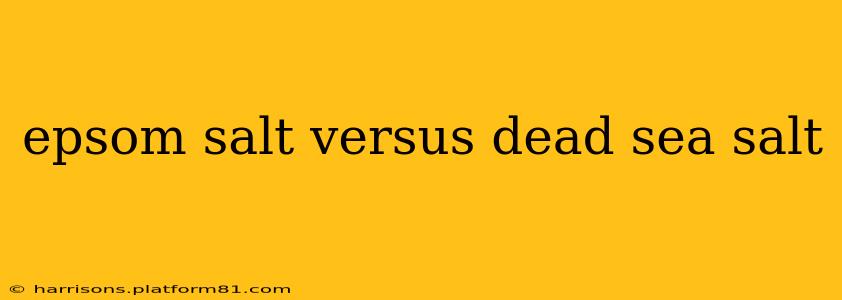Epsom salt and Dead Sea salt are both popular choices for bath soaks, but their compositions and benefits differ significantly. Understanding these differences can help you choose the best salt for your specific needs. This comprehensive guide will explore the unique properties of each, answering common questions to guide your decision.
What is Epsom Salt?
Epsom salt, chemically known as magnesium sulfate (MgSO₄), is a naturally occurring mineral compound. Unlike Dead Sea salt, it's not harvested from a specific body of water. Instead, it's typically extracted from mineral deposits found underground. Its primary components are magnesium and sulfate, both essential minerals with various purported health benefits. It's readily available and relatively inexpensive.
What is Dead Sea Salt?
Dead Sea salt originates from the Dead Sea, a unique hypersaline lake bordering Israel, Jordan, and the West Bank. Its high mineral concentration is remarkable, containing over 21 minerals and trace elements. This high mineral content is its key differentiating factor from Epsom salt and other sea salts. These minerals include magnesium, potassium, calcium, and bromide, among others. It's often considered a more premium product due to its unique origin and richer mineral profile.
What are the Benefits of Epsom Salt?
Epsom salt's benefits are primarily attributed to its magnesium and sulfate content. Many believe it offers:
- Muscle Relaxation: Magnesium is known to help relax muscles, potentially alleviating aches and pains. A warm Epsom salt bath can be particularly soothing after strenuous exercise.
- Stress Relief: Some users report that Epsom salt baths reduce stress and improve sleep quality. The warm water and magnesium may contribute to a calming effect.
- Skin Exfoliation: Epsom salt's slightly rough texture can gently exfoliate the skin, removing dead skin cells.
What are the Benefits of Dead Sea Salt?
The diverse mineral composition of Dead Sea salt is believed to provide a broader range of benefits, including:
- Skin Health: The high mineral content is thought to soothe and nourish the skin, potentially improving conditions like eczema and psoriasis. The high concentration of minerals might also help with hydration.
- Joint Pain Relief: Some studies suggest that Dead Sea salt may help alleviate joint pain and inflammation. This is often attributed to the anti-inflammatory properties of certain minerals.
- Improved Circulation: The minerals in Dead Sea salt may contribute to improved blood circulation.
Which is Better for Skin?
This depends on your skin type and concerns. Epsom salt's gentle exfoliation can benefit those with oily or acne-prone skin. Dead Sea salt, with its wider range of minerals, may be better suited for dry, sensitive, or problem skin. Always perform a patch test before using either salt on a large area of skin.
Which is Better for Muscle Soaks?
Both salts can be used for muscle soaks, but Epsom salt might be slightly more effective for muscle relaxation due to its higher magnesium content. However, Dead Sea salt's additional minerals may offer complementary benefits for overall muscle and joint health.
Which is More Expensive?
Dead Sea salt is generally more expensive than Epsom salt due to its sourcing, higher mineral content, and perceived premium quality.
Which Salt is Right for Me?
The best choice depends on your individual needs and preferences. Consider:
- Your budget: Epsom salt is a more affordable option.
- Your skin type: Dead Sea salt might be better for dry or problem skin.
- Your primary goal: Muscle relaxation might favor Epsom salt, while overall wellness might favor Dead Sea salt.
Ultimately, both Epsom salt and Dead Sea salt offer potential benefits for relaxation, skin health, and muscle relief. Careful consideration of your individual needs and preferences will guide you to the best choice. Remember to consult a healthcare professional if you have any underlying health conditions before using either salt for therapeutic purposes.
